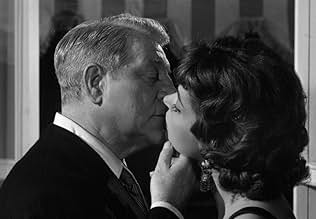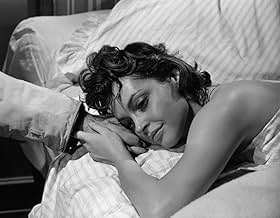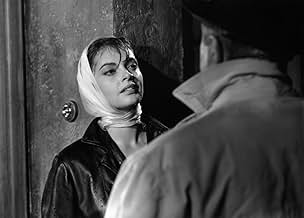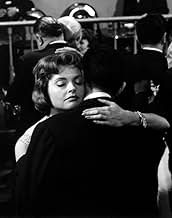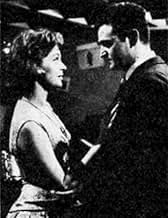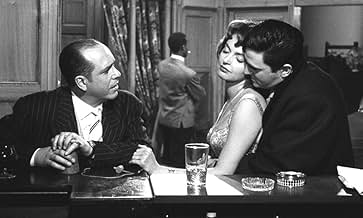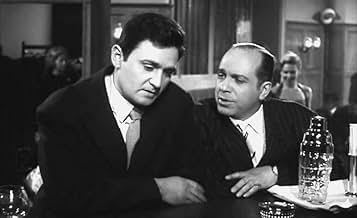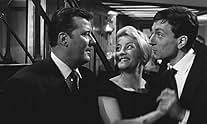PUNTUACIÓN EN IMDb
6,6/10
768
TU PUNTUACIÓN
Un subinspector de la policía de París se interesa especialmente por la difícil situación del drogadicto Lucky, a quien considera más una víctima que un criminal.Un subinspector de la policía de París se interesa especialmente por la difícil situación del drogadicto Lucky, a quien considera más una víctima que un criminal.Un subinspector de la policía de París se interesa especialmente por la difícil situación del drogadicto Lucky, a quien considera más una víctima que un criminal.
Argumento
¿Sabías que...?
- CuriosidadesFrench visa # 20248.
- ConexionesFeatured in Las películas de mi vida, por Bertrand Tavernier (2016)
Reseña destacada
It is rare for a translated title of a film to be more inspired than the original title. I think this is the case with 'Le desordre et la nuit' directed in 1958 by Gilles Grangier, one of the most prolific French film directors in the first two decades after the Second World War, and a regular collaborator of Jean Gabin, who dominates the cast of this film. The English title is 'The Night Affair', which is much more appropriate in my opinion for the story and atmosphere of this film that combines a police investigation, a sentimental thread and a social investigation into the nightlife of Parisian clubs, infested by dubious business, prostitution and drug trafficking. The presence of Jean Gabin is one but not the only reason why this film, even if it is not a masterpiece, deserves a viewing or re-viewing even over 60 years after its production.
Police Inspector Georges Vallois (Jean Gabin) is one of the police officers investigating the murder of a club owner in the sparkling Parisian night life of the 1950s. Among the suspects is Lucky Fridel (Nadja Tiller), a young German woman aspiring to be a singer, apparently one of those many girls who populate nightclubs mixing alcohol, drugs and prostitution, but who turns out to be a wealthy heiress with residency in one of the most expensive hotels in Paris. An improbable liaison develops between the two, after which Vallois decides to try to save the girl, proving her innocence and getting her out of the vicious circles in which she had sunk. Later in the story, a more mature woman appears, pharmacist Therese Marken (Danielle Darrieux), possibly Lucky's drug source, possibly more deeply involved in the crime being investigated.
I liked the atmosphere of the film, the scene of the Parisian nightclubs of the '50s, the jazz music. Hazel Scott, an American singer who had gone into exile in Paris in those years for political reasons, also starred in the film. The use of black and white film has today the effect of almost documentary authenticity. Nadja Tiller, an Austrian actress with many appearances in French and European films of the time, interprets very well the role of young Lucky, in an early and courageous approach to the theme of 'luxury' prostitution. The combination of crime, sex and on-screen music is very common today, but it was still very daring in 1958. The main problem of the film is in my opinion exactly Jean Gabin, an actor I love and admire. Gabin, perhaps the most appreciated French actor at the time, was making a transition from youth roles that largely belonged to the negative-romantic typology to the roles of maturity, mostly positive (he played Commissioner Maigret in three later films), or carrying conservative values. even when they were negative. His relationship with the young woman who may be his daughter is unbelievable not because of the age difference, but because Gabin had already adopted a paternal pose that does not fit well with romance. His kisses in this film are among the most devoid of passion in the history of cinema. On the other hand, the two dialogues in which he faces Danielle Darrieux are delicious, precisely because they have nothing to do with a sentimental intrigue. 'Le desordre et la nuit' deserves to be seen (also) for Jean Gabin, even if he seems to be acting in another film.
Police Inspector Georges Vallois (Jean Gabin) is one of the police officers investigating the murder of a club owner in the sparkling Parisian night life of the 1950s. Among the suspects is Lucky Fridel (Nadja Tiller), a young German woman aspiring to be a singer, apparently one of those many girls who populate nightclubs mixing alcohol, drugs and prostitution, but who turns out to be a wealthy heiress with residency in one of the most expensive hotels in Paris. An improbable liaison develops between the two, after which Vallois decides to try to save the girl, proving her innocence and getting her out of the vicious circles in which she had sunk. Later in the story, a more mature woman appears, pharmacist Therese Marken (Danielle Darrieux), possibly Lucky's drug source, possibly more deeply involved in the crime being investigated.
I liked the atmosphere of the film, the scene of the Parisian nightclubs of the '50s, the jazz music. Hazel Scott, an American singer who had gone into exile in Paris in those years for political reasons, also starred in the film. The use of black and white film has today the effect of almost documentary authenticity. Nadja Tiller, an Austrian actress with many appearances in French and European films of the time, interprets very well the role of young Lucky, in an early and courageous approach to the theme of 'luxury' prostitution. The combination of crime, sex and on-screen music is very common today, but it was still very daring in 1958. The main problem of the film is in my opinion exactly Jean Gabin, an actor I love and admire. Gabin, perhaps the most appreciated French actor at the time, was making a transition from youth roles that largely belonged to the negative-romantic typology to the roles of maturity, mostly positive (he played Commissioner Maigret in three later films), or carrying conservative values. even when they were negative. His relationship with the young woman who may be his daughter is unbelievable not because of the age difference, but because Gabin had already adopted a paternal pose that does not fit well with romance. His kisses in this film are among the most devoid of passion in the history of cinema. On the other hand, the two dialogues in which he faces Danielle Darrieux are delicious, precisely because they have nothing to do with a sentimental intrigue. 'Le desordre et la nuit' deserves to be seen (also) for Jean Gabin, even if he seems to be acting in another film.
- dromasca
- 12 jun 2020
- Enlace permanente
Selecciones populares
Inicia sesión para calificar y añadir a tu lista para recibir recomendaciones personalizadas
Detalles
- Duración1 hora 33 minutos
- Color
- Mezcla de sonido
- Relación de aspecto
- 1.66 : 1
Contribuir a esta página
Sugerir un cambio o añadir el contenido que falta

Principal laguna de datos
By what name was El desorden y la noche (1958) officially released in Canada in English?
Responde
